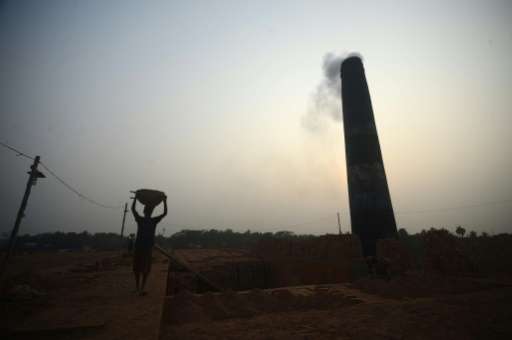Workers feeling the heat as climate change slashes productivity

Climate change is exposing millions of workers to excessive heat, risking their health and income and threatening to erase more than $2.0 trillion in annual productivity by 2030, a UN report warned Thursday.
More than one billion workers in countries hard-hit by global warming are already grappling with increasing severe heat, according to the report: "Climate Change and Labour: Impacts of Heat in the Workplace."
"Already in the current situation, several percent of working hours can be lost in highly exposed regions," said the report, a collaboration between several UN agencies and international unions.
The global productivity loss is expected to top $2.0 trillion annually by 2030, as sweltering temperatures force outdoor workers and manual labourers to slow down, take longer breaks or even move to find work in a cooler climate.
"When workers are put under these hot-house conditions, their capacity to work is dramatically impacted," Philip Jennings, head of UNI Global Union, told AFP.
Working in temperatures over 35 degrees Celsius (95 degrees Fahrenheit) is considered health hazardous.
Some labourers exposed to such conditions have no choice but to continue working, sometimes without access to drinking water or shade to cool off in.
"Those who work in the fields may ruin their health just by trying to put a meal on the table," Saleemul Huq, head of the International Centre for Climate Change and Development, warned in a statement.
An estimated four billion people live in the areas most exposed to climate change.
Those regions include much of southern Asia, the southern United States, Central America and the Caribbean, northern South America and north and west Africa.
In West Africa, the number of very hot days each year has already doubled since the 1960s, with an increase of around 10 additional hot days each decade, the report said.
And in Kolkata, India, each decade brings an additional 12 days where the mercury soars above 29 C, it said.
India has already lost around three percent of available daylight working hours annually due to extreme heat, and without dramatic action to rein in global warming could be looking at eight percent respectively by 2085, the report showed.
The report comes after 160 nations last week signed a historic agreement reached in Paris aimed at keeping a rise in global temperatures below 1.5 degrees Celsius.
But experts warn that capping the global temperature rise at that level will be difficult, with many expecting at least a 2 C rise.
And if the world does not act to rein in greenhouse gas emissions, scientists say the world is heading for a 4 C warmer world.
Thursday's report warned that even if global leaders manage to limit warming to 1.5 C, some of the hardest-hit areas will see an entire month of added extreme heat in 2030 compared to 2010.
© 2016 AFP





















